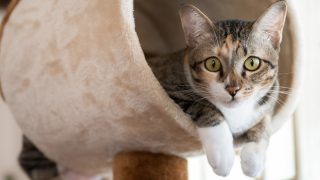
Banning Cat Declawing (Delaware)
H.B. 333
Delaware lawmakers are considering banning cat declawing, a surgical procedure in which all or part of the last bone in a cat’s toes is amputated. It can have lifelong medical implications and stops a cat from exhibiting natural behaviors.
Status
Declawing is a permanent, surgical procedure in which all or part of the last bone in a cat’s toes is amputated. Also known as onychectomy, declawing is a highly invasive surgery — a series of amputations of the last bones of the 10 front toes (and sometimes the eight rear toes as well).
Now, Delaware lawmakers are considering banning the practice throughout the state.
Because of the risk to the cat’s well-being and the behavioral issues that can result from declawing, the procedure is not fully condoned by any veterinary medical association. The American Animal Hospital Association, the Humane Society Veterinary Medical Association, the Canadian Veterinary Medical Association, and the Association of Feline Practitioners have all stated opposition to the practice as an alternative to relinquishment, and the American Veterinary Medical Association strongly advises against it.
If H.B. 333 is enacted, Delaware would become the third U.S. state to prohibit the practice of cat declawing, joining New York and Maryland.
The Animal Legal Defense Fund strongly supports H.B. 333, which was introduced by State Rep. Andria L. Bennett (D-32). It was approved by the Delaware House of Representatives on June 16, 2022. It failed to pass the Senate this session.
Another state bill supported by the Animal Legal Defense Fund, H.B. 386, would prohibit landlords from requiring tenants to have their cats declawed as a condition for entering into or renewing a lease.
To find more information about animal-friendly legislation in Delaware, visit aldf.org/delaware.
Sign Up!
Join the Animal Legal Defense Fund's email list to stay up to date on lawsuits, legislation, and regulations affecting animals.


